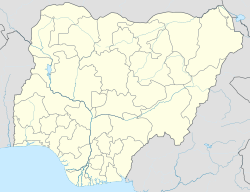This article needs additional citations for verification. (April 2017) |
Okigwe is the third largest city in Imo state in Nigeria after Owerri and Orlu. Okigwe is located in the Okigwe Local Government Area (LGA) of Nigeria.[citation needed] The city lies between the Port Harcourt-Enugu-Maiduguri rail line, being the nearest city to the biggest cattle market in Nigeria located in the Umu Nneochi Area of Abia state. Thus, the city has grown into a major cattle transit town for the South-East and South subregions of Nigeria.[citation needed] Okigwe has a population of 132,237 (2005 census). Most of the population is made up of immigrant workers from other states. Okigwe city was the primary host site of the old Imo State University (now Abia State University). Okigwe has various tourist and historical sites.[citation needed] Okigwe remains one of the breadbaskets of Nigeria with terrace cultivation practised on its hilly farmlands.[citation needed] St. Mary's Cathedral in Okigwe is the seat of the Roman Catholic Diocese of Okigwe.[citation needed] In 2016, the Imo state government recommissioned a new cattle market in the city in respect to the previous one that has been relocated to Abia.[1]
Okigwe | |
|---|---|
LGA and town | |
 Senator Hope Uzodimma's Hall, Okigwe Local Government Headquarters | |
| Coordinates: 5°28′59″N 7°33′00″E / 5.483°N 7.55°E | |
| Country | Nigeria |
| State | Imo State |
| Time zone | UTC+1 (WAT) |
| National language | Igbo |
 | |
Autonomous communities and villages
editOkigwe has six autonomous communities with different villages (in bracket) namely;[2]
- Ezinachi (Ndiohia, Umudiaba, Amukwa, Amorie, Umuokparaoba, Amajarata, Obiohia, Umudo, Ndi Ngeleogwe, Umuebiri, Ubahu, Ajanumuna, Amachi, Umuike, Amachara, Umuoma, Umunuma, Umuoho, Uhugbuala/Ndizorie, Ovoro/Umuagu),
- Ikigwu (Aro-ubaha, Aro-Okigwe, Ope, Ubanaka, Umuka, Umuokpara),
- Otanzu (Amaeze-Ogii, Umuawa-Ogee, Umualumoke, Amuro (Amuro, Aro-Amuro),
- Umulolo (Agbobu, Agbuala, Aku/Ihette, Aku/Ikenga, Amaosu, Amasator, Aro-Agbobu, Aro-Umulolo West, Aro-Umulolo East, Ibinta, Ndi-Oji, Ndi-Okoroji, Okanachi, Umuawa-Ibu)
- Ihube (Agbala, Akpugo, Amagu, Amalator, Amano, Nkoto, Ogube, Ozara)
- Otan-Chara (Alaike-Ogwaku, Alaocha-Igwaku, Ihitte-Isiokwe, Ikenga, Ikenga-Isiokwe, umuinem, umuzegem, Umueze, Umukeoke).
Agriculture and soil
editThe soil is predominantly partly red clay and black or dark brown. The major crops grown in the district on its hilly farmlands are palm trees (palm oil and palm wine), cassava, and vegetables.[3]
Climate
editRarely falling below 58°F or rising beyond 90°F, the weather is consistently warm throughout the year. The wet season is partially gloomy and humid.[4]
See also
editReferences
edit- ^ "Cattle market re-opens 11-years after". The Guardian Nigeria News - Nigeria and World News. 2016-12-18. Retrieved 2021-09-11.
- ^ "List of Towns and Villages in Okigwe L.G.A". 10 March 2014.
- ^ "(PDF) Physicochemical Parameter of Palm Oil and Soil from Ihube Community, Okigwe, Imo State Nigeria". ResearchGate. Retrieved 2021-09-11.
- ^ "Okigwe Climate, Weather By Month, Average Temperature (Nigeria) - Weather Spark". weatherspark.com. Retrieved 2023-09-15.
